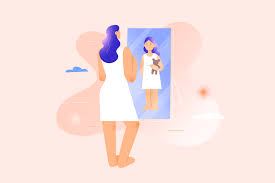Find the Lost Inner Child & Reconect – Musings on Life Series – 16
“Hello inner child, I am the inner babysitter – Terry Pratchett”
The hidden part
of our personality that is playful, spontaneous & creative – childlike and depending
on the circumstances are accompanied by anger, hurt, fear.
Yes that’s your
inner child!!
Experts describe
this inner child as an expression of not just your child self, but
your lived experience of all life stages. The inner child is also a source of your
strength, since early experiences can play a significant part in your
development as an adult.
Is it possible
to lose your inner child? YES OF
COURSE!!
Past
experiences, especially traumatic ones, can lead to emotional wounds that
disconnect you from your inner child. You lose your inner child at the point when
you think that you do not need it anymore. You lose it when you succumb to the pressures of
society, when you get a little too conscious, and when you think that others
might begin to laugh at you.
Not everyone may
feel in touch with their child within. However, their childhood self may come
out in behaviours, emotional reactions, or communication styles during times of
extreme emotion. These behaviours might look like trying to receive reassurance
from a partner, crying from overwhelm, or having the urge to yell when you have
a bad day. An inner child may also show themself positively through playful
behaviours, joking, adventurousness, impulsivity, creativity, and
imagination.
This process can
increase self-awareness, self-love, and connection. Some common themes in
adulthood that people may address or discuss when they do inner child work
include
• Self-sabotage / Self-defeating
behavior
• Passive-aggressive behavior
• Anger challenges
• Emotional suppression or repression
• Insecure attachment
• Difficulty letting go of the past
“Your inner
child is part of your personality that still reacts and feels like a
child." Many adults experience these patterns, and it may not only be
those who have experienced a traumatic childhood event that benefit from inner
child work. Past experiences such as deflection, comments made by your family
or classmates, and feeling misunderstood as a kid are topics you can discuss
through inner child work that may not be traumatic but can still impact you.
A few benefits
you might experience from inner child work can include the following:
• Understanding your past
• Feeling connected with yourself
• Forgiving your caregivers or
parents
• Forgiving yourself
• Imagining an ideal childhood
• Feeling safe in your body and home
• Feeling able to parent and care for
yourself
• Feeling able to be alone and
independent
NEVER LET AGE EXTINGUISH YOUR INNER
CHILD!!!
Why should you
try to find the lost child in you??? Finding your inner child can help
make it easier to understand your adult experience, heal from pain in your
past, and handle any future challenges with self-compassion.
How to find my
inner child: To do this, you begin by asking your adult self to be a little
open and possibly, vulnerable. In order for your inner child to come out of
hiding and to share about what is going on or what it's needing, we need to be
open to hearing and seeing its story; curious about its life, its hopes,
dreams, fears and worries.
This kind of
self-discovery helps you to understand your behaviours, triggers,
wants, and needs. When you begin inner child healing work, you tap
into a part of yourself that is vulnerable and impressionable.
What Must I do
to Find My Inner Child:
- · Keep an open mind
- · Look back to your childhood and think what games or activities you enjoyed the most.
- · Revisit childhood memories
- · Spend time doing things you use to enjoy
- · Talk to your inner child
- · “If we have wounds due to hurt or trauma, writing about that trauma can help us connect with the child within”
- · During this reconnection, we tap into and perhaps understand some of the reasons for adult fears, phobias, and life patterns. Understanding our inner child helps us see the reasons why we’ve become who we are today.
- · Writing can be a powerful tool for connecting with your inner child, so you don’t need to speak out loud. Try holding a specific thought in your head to guide your letter or journaling exercise, or use stream-of-consciousness writing to express any thoughts that come to mind.
- · You can even frame it as a question-and-answer exercise. Allow your adult self to ask your child self questions, then listen to how the child responds.
·
Maybe your child self is small, vulnerable, and
in need of protection and support. Maybe, on the other hand, it’s joyfully
thriving. Answering any questions your child self has can help you begin
healing inner vulnerabilities or distress.
·
It’s normal to feel a little nervous about what
your inner child wants to share, especially if you’ve buried some negative past
experiences or difficult emotions.
·
But think of this exercise as a way to establish
and strengthen a bond between your current self and your child self.
·
If reaching out to your inner child triggers
discomfort or painful emotions, including grief traumatic memories, and feelings of helplessness
or fear seek guidance from a psychologist or therapist. A therapist can
offer support and introduce you to coping strategies that can help you face
trauma and emotions from the past.
Today being
Children’s day – Nov 14th, let us all Reflect, Rejuvenate and Reconnect with the
Child in Us!!
I have started reconnecting with my inner child, how about you?
Regards,
Aparna S
CEO &
Founder,
Transformational
Business Solutions





Comments
Post a Comment